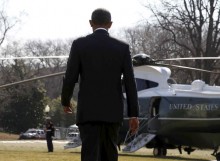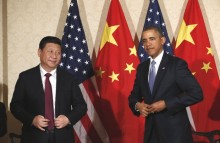The Day asked the experts to answer the following questions.
♦ What massages is Obama going to send to Europe, Russia, and Ukraine during his visit to Europe and Saudi Arabia?
♦ Do you think that the second round of sanctions is enough to stop Russia from attacking eastern part of Ukraine or Obama should make stronger statement and say that all options are on the table to defend territorial integrity of Ukraine?
♦ How do Americans feel that their guaranty of sovereignty, territorial integrity to Ukraine given in Budapest memorandum has not worked?
♦ Taking into account that in Europe at the same time will be Chinese President should one expect that Obama will try to get President Xi on his side to put pressure on Russia for it to deescalate situation in and around Ukraine?
Steven PIFER, Senior Fellow at the Brookings Institution’s Center on the United States and Europe:
“Europe: he will reiterate the unacceptability of Russia’s blatant seizure of Crimea and of its continuing pressure on Ukraine. I expect that Mr. Obama will also use his discussions with the G7 and European leaders to forge a strong and united Western message of support for Ukraine and condemnation of Russia.
“The financial sanctions announced by the White House on Thursday might seem limited – just naming some 20 individual Russians and one bank – but they already appear to be causing considerable concern in Russian financial circles. There is a good chance that additional sanctions will be announced when Mr. Obama is in Europe this week. Should the Russian military enter eastern Ukraine, I would expect very strong financial and economic sanctions to be applied by the West. Whether the threat of such sanctions will suffice to deter Mr. Putin from further aggression against Ukraine remains to be seen. But the West has the ability to inflict substantial pain on the Russian economy if it chooses to use its leverage.
“Russia has clearly violated the commitments it made under the Budapest Memorandum to respect Ukraine’s sovereignty and territorial integrity and not to use force against Ukraine. That will cause greater distrust in Mr. Putin and the Kremlin in general. It is incumbent on the United States and Britain, as co-signers of the memorandum, to act to support Ukraine and penalize Russia for violating the commitments that it made.
“President Obama has already discussed Ukraine with the Chinese president. China abstained in last week’s UN Security Council vote on the Ukraine resolution, leaving Russia totally isolated in casting its veto. My guess is that, in the event of further Russian aggression against Ukraine, China will express greater criticism, though it is probably unrealistic to expect China to sanction Russia.”
Stephen LARRABEE, Distinguished Chair in European Security at the Rand Corporation:
Europe: “Obama will emphasize the importance of closely coordinating US and European policy regarding Ukraine to ensure that western governments speak with one voice and encourage the Europeans to agree to tough sanctions. He will also encourage the Europeans to increase their economic assistance to Ukraine in order to help stabilize the Ukrainian economy.”
Russia: “Obama will stress the importance of deescalating the current tension between Russia and the United States and the severe consequences for Russia of any attempt to intervene militarily in Ukraine.”
Ukraine: “Obama will underscore US political support for Ukraine; stress the importance of carrying out a coherent program of economic and political reform; and the necessity to drastically reduce corruption.”
Sanctions: “I think the present sanctions are enough at this point. The problem is that it will take time before the sanctions begin to show results.”
American Public: “The American public is very concerned that Russia has not upheld the pledges it made in the Budapest memorandum and has violated the territorial integrity of Ukraine.”
China: “Obama will seek to persuade join to use its influence to encourage Moscow to deescalate the situation in and around Ukraine.”









